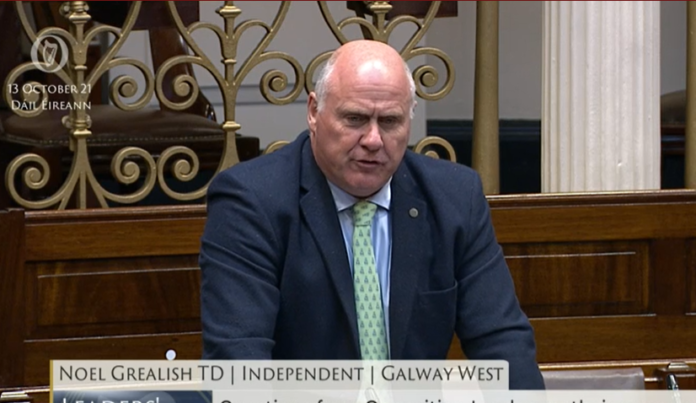Galway TDs spoke in favour of a Dáil motion to provide more funding and support for people with disabilities who have mobility issues.
Galway East TD Seán Canney introduced the motion put forward backed by the Regional Group, which highlighted the “years of inaction” by successive governments to address transport supports for people with a disability.
Deputy Canney said that it is important to look at the issue of mobility for people with a disability in a “humane” way, noting that there are people who are cut off from their community, or unable to work
“The fact that successive governments have not addressed this issue is a shadow on politics. It is important that we get it right, and that we get it right now.”
“We talk a great deal about employability for people with disabilities. Unfortunately, if they cannot leave their house, it is a very poor start.”
The private members motion noted that households where someone has a disability spend on average over €9,000 on special items specifically related to that disability, transport, etc.
Deputy Canney added that in rural areas like east Galway, public transport is not available for many outside of the towns, and that we can’t wait for it to be improved to help isolated people.
The motion called on the government to provide funding for a scheme to replace the Mobility Allowance and Motorised Transport Grant, which was discontinued in 2013, as a matter of urgency.
It also calls for reform of the Primary Medical Certificate process, which he said is not fit for purpose, address discriminatory eligibility criteria, and to improve transport infrastructure and public transport access for people with a disability.
Galway West TD Noel Grealish added that there is a “looming crisis” for people buying vehicles adapted for wheelchair users or others with a disability.
He said that many manufacturers of wheelchair adapted cars are switching over to only making electric vehicles.
“This is a problem that is looming large now, not just something that is going to arise as we approach 2030, the year by which sales of new petrol and diesel cars will be banned.”
“While electric vehicles up to a certain value are exempt from VRT, they are way more expensive than the diesel or petrol models that have been used by these families and individuals up to now.”
“We are talking about an increased cost of perhaps €10,000 to €20,000 that they will face just to make it possible to do basic things like get to work, go to the shops, bring a child to school or to attend medical appointments.”
He said that people with a primary medical certificate should be offered financial support to switch over to electric vehicles, similar to a €15m scheme for taxi drivers announced earlier this month.
Galway-Roscommon TD Denis Naughten said that people with mobility issues have effectively bee living with a “9-year lockdown” since the end of the Mobility Allowance and Motorised Transport Grant.
“So, while we have all experienced firsthand what it is like to be confined to our own homes due to Covid restrictions, think what it must be like for a person with a disability who has been effectively in lockdown in their own homes for the past 460 weeks.”
“It is impossible for people with disabilities to be able to lead full and active lives within our communities throughout this country without access to public and personal transport,” said Denis Naughten.
He hit out at the eligibility criteria for a primary medical certificate, needed to access the disabled driver and passenger scheme, saying that it is “totally inadequate” to meet the needs of people with a disability.
The Dáíl heard that the motion brought forward by the Regional Group was being accepted by the government.
Minister for Disability Roderic O’Gorman said that €13.35 million was secured in budget 2022 to ensure that public transport is accessible for people with disabilities, including by retrofitting old services.
Minister of State Anne Rabitte, says that the “critical issues” raised in this motion are being addressed through the National Disability Inclusion Strategy (NDIS) transport steering group, which she chairs.
The Department of Finance will be reviewing the criteria for a primary medical certificate, she said, and added that she is leading the review of how that mobility allowance and motorised transport grant schemes can be redeveloped.
“We have ongoing work on accessible public transport being led by the Minister for Transport, in partnership with the National Transport Authority, some of which is focused specifically on rural challenges,” Anne Rabbitte added.
“The task that Government has set itself over the coming months is to identify where needs are not being addressed and to see how to respond to these needs.”
“That is my focus in leading the transport working group and that is the programme of work that lies before us.”











